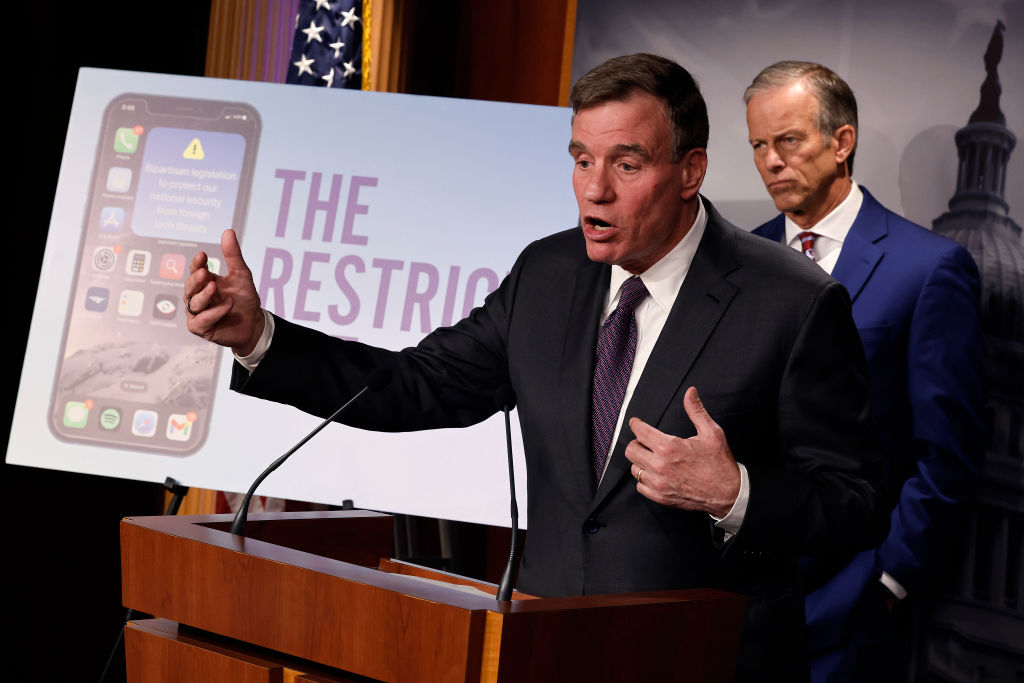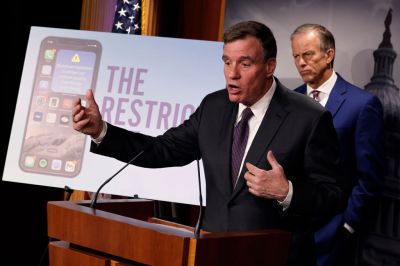The growing consensus in Washington, D.C., is that the social media company TikTok—a subsidiary of the Chinese company ByteDance—is a national security threat. The app’s collection of American users’ data, its obligation under Chinese law to provide that data to the Chinese Communist Party, and its ability to disseminate CCP propaganda and suppress anti-CCP dissent through its algorithm are all widely cited concerns.
What’s dividing most political leaders now is what to do about TikTok. Seeking to avoid a repeat of the Trump administration’s ill-fated 2020 attempt at a ban of the app, the Biden administration wants Congress to act.
A plethora of bills to address the issue have been introduced, and more drafts may be en route. But one in particular has bipartisan support and an endorsement by the White House: the RESTRICT Act, introduced by Virginia Democratic Sen. Mark Warner and South Dakota Republican Sen. John Thune earlier this month. It now boasts 25 cosponsors in the Senate.
If TikTok were truly banned, it would eventually be removed from U.S. mobile app stores. In theory, some committed users might still be able to access it by way of virtual personal networks (VPNs), but even then, Apple and Google’s digital rights management (DRM) software could still block the app from running. Proponents of the RESTRICT Act, including Warner, have expressed confidence that content creators reliant on TikTok could migrate to other sites if the app disappeared.
But the RESTRICT Act still has a long way to go before becoming law. It has received criticism on multiple fronts, including from China hawks who say it would be mostly ineffective and from civil libertarians concerned about the growth of executive power and potential infringement on Americans’ First Amendment rights.
How would the RESTRICT Act work?
Unlike bills introduced by Sens. Marco Rubio and Josh Hawley, the RESTRICT Act wouldn’t target TikTok or ByteDance directly. Instead, it would authorize Secretary of Commerce Gina Raimondo to “review and prohibit certain transactions between persons in the United States and foreign adversaries.” The secretary, in consultation with the rest of the executive branch, could then use that authorization to ban or otherwise restrict TikTok or other foreign tech products.
The bill would give the commerce secretary 180 days from its passage to review any “covered transactions”—those involving entities directly or indirectly under the control of a “foreign adversary”—and then another 180 days to determine whether those transactions constitute an “undue or unacceptable risk” and thus whether they should be “prohibited” or mitigated. Afterwards, the secretary would publicly explain why the denied or mitigated transaction represented a risk.
The bill arbitrarily defines covered holdings as those with 1 million or more U.S. users, and the secretary is given authority to come up with new regulations for addressing such transactions moving forward.
What do proponents say?
The bill’s broad, comprehensive approach is a feature, not a bug, for its proponents. In the rapidly evolving tech sector, federal legislation has a tendency to become obsolete quickly, so the RESTRICT Act is meant to provide a “rules-based process” that transcends a one-off attempt to ban TikTok “so we aren’t playing Whac-A-Mole,” Warner said.
“Today, the threat that everyone is talking about is TikTok,” he said in a press release announcing the bill. “Before TikTok, however, it was Huawei and ZTE, which threatened our nation’s telecommunications networks,” a reference to two Chinese companies repeatedly targeted by U.S. sanctions in recent years.
In addition to applying to technologies beyond TikTok, the bill’s breadth also helps avoid a “too-common approach that imprecisely flattens a variety of risks into a ‘risk’ or ‘no risk’ binary, and then funnels the action into a total ban or no ban,” according to a blog post by Justin Sherman, a fellow at the Atlantic Council’s Cyber Statecraft Initiative.
Unintended consequences?
Some civil libertarians, meanwhile, worry about what they call “insanely far-reaching” provisions.
One section in particular has come under fire: The commerce secretary can use “any mitigation measure to address any risk arising from any covered transaction by any person, or with respect to any property, subject to the jurisdiction of the United States,” in consultation with other agency heads.
That gives the executive branch a wide berth that some worry could be used to justify cracking down on people using VPNs to access prohibited apps.
Others are concerned the bill wouldn’t do enough to achieve most supporters’ intended outcome: banning TikTok. Because nothing in the bill addresses the company specifically, Raimondo could kick the can down the road by deferring to the ongoing review of TikTok by the Committee on Foreign Investment in the United States (CFIUS), an interagency panel that seems to be in no rush.
Nathan Leamer, a former policy adviser at the Federal Communications Commission (FCC), suggested a different approach: Putting a “shot clock” on the evaluation processes that already exist rather than creating something totally new. For example, Congress could provide that if CFIUS didn’t finish its investigation of a company for national security risks in a given time frame—say, two years—the president could petition an independent agency like the FCC to take over and wrap things up. And Congress, rather than the executive branch, would provide accountability.
“What’s neat about this is that it takes it out of the president’s hands,” he said.
Regardless of what happens to the RESTRICT Act or other legislative proposals, Congress is likely to remain keenly interested in TikTok due to its close ties to the CCP. Leamer drew a distinction between the contents of TikTok videos—which almost always fall under First Amendment protections—and the conduct of the company, which involves the highly dubious use of users’ personal data.
“We’re talking about the conduct of a Chinese spy app,” he said. “We’re not talking about content.”





Please note that we at The Dispatch hold ourselves, our work, and our commenters to a higher standard than other places on the internet. We welcome comments that foster genuine debate or discussion—including comments critical of us or our work—but responses that include ad hominem attacks on fellow Dispatch members or are intended to stoke fear and anger may be moderated.
With your membership, you only have the ability to comment on The Morning Dispatch articles. Consider upgrading to join the conversation everywhere.